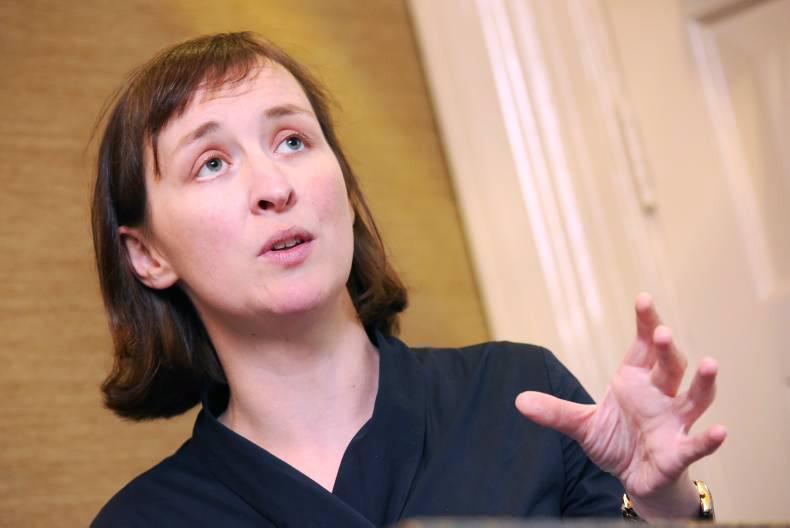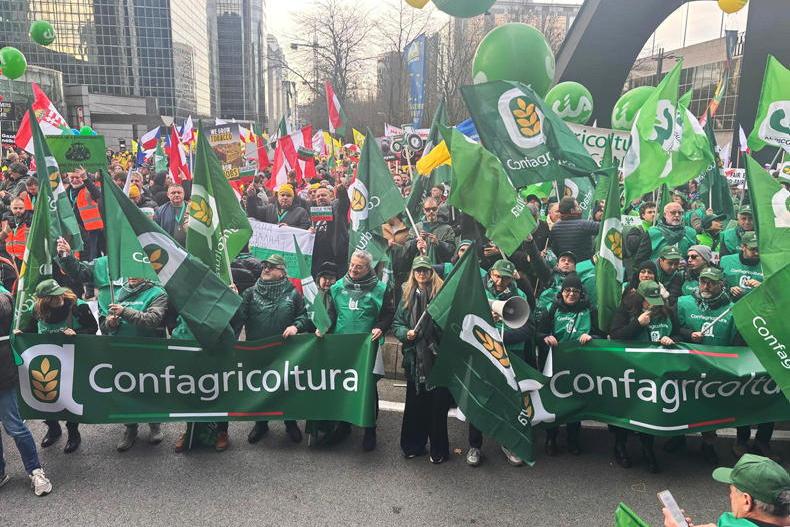Despite expressing the shock being felt by many at the decision of over half of the British electorate to vote to leave the European Union on Thursday 23 June, Rowena Dwyer, chief economist with the Irish Farmers Association (IFA), says the decision has been taken now and there is "no point in lamenting it".
At the IFA's Brexit briefing earlier this month, Dwyer highlighted the figures that would become all-important in case of a Brexit. For example, the value of Irish beef exports in 2015 was €1.1bn (accounting for 50% of Ireland’s total beef exports), the value of Irish dairy exports was €1bn and the value of Irish pigmeat exports to the UK market was €350m.
"To put it mildly, the consequences of this are not ones we really thought we'd have to face as a sector but it has happened now and what we're looking at is dealing with both the short and long-term consequences," Dwyer told the Irish Farmers Journal after the shock result was announced.
Short-term
She added that the biggest challenge in the short-term is the exchange rate fluctuations between the euro and sterling. Sterling plummeted in the immediate aftermath of the result on Friday morning, trading by as much as 10% against the euro, hitting £0.83 at one point.
"Already we’ve seen sterling weaken and it is unclear what will actually happen in the next few days and weeks," Dwyer said. "In practical terms a weaker sterling means lower product prices for export to the UK. We know our market to the UK is so important – so the really important thing is to get certainty on the table soon to stabilise the currencies."
And just how can that certainty be brought to the table?
"The governments and banks can do that by coming out and accepting that this has happened, there is no point in lamenting it. The thing to do now is to look forward and see what will be the best outcome for the EU and the UK in developing their new relationship."
The process of negotiating this new relationship has a deadline of two years from the time the UK decides to invoke Article 50 of the Treaty of Lisbon. This might not be for another three months, until such time as a new prime minister is in place, David Cameron having announced his intention to step down after the final result.
It would not be in our interest to have tariffs on our exports to the UK or tariffs on their imports to us
According to Dwyer, the best-case scenario in terms of the type of trade relationship negotiated between the UK and EU is one that minimises barriers to trade as far as possible.
"It would not be in our interest to have tariffs on our exports to the UK or tariffs on their imports to us," she said.
"We are now one of 27 member states, and we will have to agree a new trading relationship with the UK. But a balance will have to be found between agreeing a new trade relationship with the UK that is positive, while acknowledging that the UK has voted to leave Europe. So it cannot enjoy the same membership benefits that we all have. That is going to be a significant challenge in the months ahead."
So are food exports to the country likely to be affected in the long-term?
Dwyer is cautiously positive.
"I would expect that exports to the UK are likely to continue to grow...it is still a growing market, the issue is that our exports will not grow at the same rate."
Listen to our full interview with Dwyer on the practical implications of Brexit for farmers below
CAP 2020
Of all the issues that have arisen in the wake of the British people's decision to leave the EU, the IFA's chief economist is most passionate on the subject of the CAP 2020.
It would be unacceptable to put farmers in a situation where they wouldn’t have certainty around CAP money
"The key issue is that the UK is currently a net contributor to the CAP," she said. "We had a CAP reform that was quite difficult to negotiate so we will be saying to the Irish government that in the course of their negotiations with the UK there has to be certainty around the EU budget up to 2020.
"Whatever the time-frame is that the UK remains a member of the EU this period up to 2020 was seriously negotiated and it would be unacceptable to put farmers in a situation where they wouldn’t have certainty around that money."
The EU's annual budget under the CAP is €150bn to which the UK is a net contributor of approximately €8bn.
Trade deals with South America
Dwyer is reassuring on the question of whether South American countries are now likely to use the UK as a "back door" for exporting beef into Europe, having been thwarted in their desires to have a beef quota included in the first Mercosur offer this year.
She acknowledges there is a "very real fear around this" but adds that she expects the priority for the UK will be to concentrate on their trade negotiations with the EU.
"It is a more valuable market for them," she said. "And therefore, I think the focus for the UK’s trading parties will be to negotiate the best deal they can with the EU."
Read more
Full coverage: Brexit
Despite expressing the shock being felt by many at the decision of over half of the British electorate to vote to leave the European Union on Thursday 23 June, Rowena Dwyer, chief economist with the Irish Farmers Association (IFA), says the decision has been taken now and there is "no point in lamenting it".
At the IFA's Brexit briefing earlier this month, Dwyer highlighted the figures that would become all-important in case of a Brexit. For example, the value of Irish beef exports in 2015 was €1.1bn (accounting for 50% of Ireland’s total beef exports), the value of Irish dairy exports was €1bn and the value of Irish pigmeat exports to the UK market was €350m.
"To put it mildly, the consequences of this are not ones we really thought we'd have to face as a sector but it has happened now and what we're looking at is dealing with both the short and long-term consequences," Dwyer told the Irish Farmers Journal after the shock result was announced.
Short-term
She added that the biggest challenge in the short-term is the exchange rate fluctuations between the euro and sterling. Sterling plummeted in the immediate aftermath of the result on Friday morning, trading by as much as 10% against the euro, hitting £0.83 at one point.
"Already we’ve seen sterling weaken and it is unclear what will actually happen in the next few days and weeks," Dwyer said. "In practical terms a weaker sterling means lower product prices for export to the UK. We know our market to the UK is so important – so the really important thing is to get certainty on the table soon to stabilise the currencies."
And just how can that certainty be brought to the table?
"The governments and banks can do that by coming out and accepting that this has happened, there is no point in lamenting it. The thing to do now is to look forward and see what will be the best outcome for the EU and the UK in developing their new relationship."
The process of negotiating this new relationship has a deadline of two years from the time the UK decides to invoke Article 50 of the Treaty of Lisbon. This might not be for another three months, until such time as a new prime minister is in place, David Cameron having announced his intention to step down after the final result.
It would not be in our interest to have tariffs on our exports to the UK or tariffs on their imports to us
According to Dwyer, the best-case scenario in terms of the type of trade relationship negotiated between the UK and EU is one that minimises barriers to trade as far as possible.
"It would not be in our interest to have tariffs on our exports to the UK or tariffs on their imports to us," she said.
"We are now one of 27 member states, and we will have to agree a new trading relationship with the UK. But a balance will have to be found between agreeing a new trade relationship with the UK that is positive, while acknowledging that the UK has voted to leave Europe. So it cannot enjoy the same membership benefits that we all have. That is going to be a significant challenge in the months ahead."
So are food exports to the country likely to be affected in the long-term?
Dwyer is cautiously positive.
"I would expect that exports to the UK are likely to continue to grow...it is still a growing market, the issue is that our exports will not grow at the same rate."
Listen to our full interview with Dwyer on the practical implications of Brexit for farmers below
CAP 2020
Of all the issues that have arisen in the wake of the British people's decision to leave the EU, the IFA's chief economist is most passionate on the subject of the CAP 2020.
It would be unacceptable to put farmers in a situation where they wouldn’t have certainty around CAP money
"The key issue is that the UK is currently a net contributor to the CAP," she said. "We had a CAP reform that was quite difficult to negotiate so we will be saying to the Irish government that in the course of their negotiations with the UK there has to be certainty around the EU budget up to 2020.
"Whatever the time-frame is that the UK remains a member of the EU this period up to 2020 was seriously negotiated and it would be unacceptable to put farmers in a situation where they wouldn’t have certainty around that money."
The EU's annual budget under the CAP is €150bn to which the UK is a net contributor of approximately €8bn.
Trade deals with South America
Dwyer is reassuring on the question of whether South American countries are now likely to use the UK as a "back door" for exporting beef into Europe, having been thwarted in their desires to have a beef quota included in the first Mercosur offer this year.
She acknowledges there is a "very real fear around this" but adds that she expects the priority for the UK will be to concentrate on their trade negotiations with the EU.
"It is a more valuable market for them," she said. "And therefore, I think the focus for the UK’s trading parties will be to negotiate the best deal they can with the EU."
Read more
Full coverage: Brexit









SHARING OPTIONS